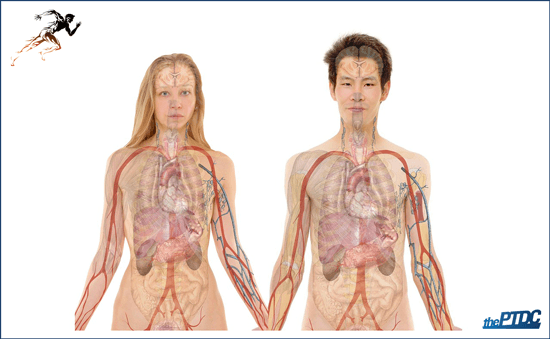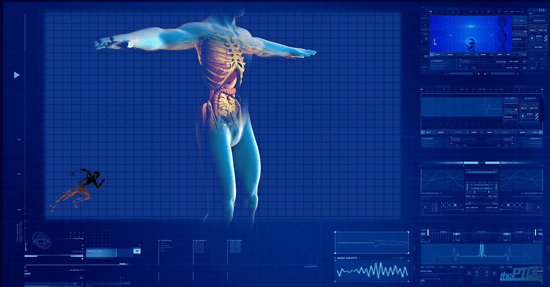In today's busy society, it's our lifestyles, nutrition and environment that hold us back and put negative strain on most of our body's systems. The digestive system is one of these systems.
My eyes were first opened to this when I started taking antibiotics for my skin. Just as your body is made up of trillions of cells, it's also host to trillions of bacteria. The role of antibiotics is to kill off bad bacteria to make us feel better again, yet they also destroy the good bacteria.
When antibiotics destroy some of the good bacteria in our guts, we can experience poor digestion. As a result of my antibiotic use, I experienced IBS-like symptoms for years.
At the time I wasn't knowledgeable enough to connect the dots, so I just lived with it. As I learnt more about the digestive system, I realized that I did have full control over it. Nowadays as a coach, my goal is to empower my clients with this ability to improve their digestive health.

First, a Primer: How Your Digestive System Works
Close your eyes. Now imagine your favourite meal set before you. The smell of it fills the air and you can already feel that first bite on your tongue. Ok, stop now. My guess is that has just made you hungry, and your mouth is watering too. The brain kick-started your digestive system before you even got your first bite.
If you were to eat that meal, you'd take a bite and start chewing. This chewing will increase the surface area of the food, while the salivary glands start releasing an enzyme called amylase to breakdown carbohydrates.
From here, with help of a process called peristalsis, food is passed down the esophagus and enters the stomach. The stomach mixes and crunches the food some more, with protein being the main nutrient digested here. This occurs via the activation of the pro-enzyme pepsinogen, which is converted to the active enzyme pepsin.
For this process to occur, the body will release adequate amounts of HCL (hydrochloride acid), which signals the rest of the digestive system to get ready.
After being in the stomach for 1-3 hours, the stomach contents are passed along to the small intestine. Most digestion and absorption takes place as food reaches the first section of the small intestine, the duodenum.
In order for fats to be fully broken down, bile is required from the liver and the gallbladder to emulsify fats before the pancreas adds its pancreatic enzymes so all of the macronutrients can be broken down further. These enzymes are made of protein.
Micronutrients, vitamins, and minerals are already small enough that they don't have to be broken down, and the small intestine can just absorb them. The final digestive role for the pancreas is to release bicarbonate to neutralize stomach contents.
The process of peristalsis continues, further moving the digested food through the small intestine. At this point, the villi (tiny little fingers that stick out of the small intestine's surface), secrete more enzymes that help with the final stages of digestion.

The result of this process:
The carbohydrates you ate have been turned from larger sugars to single sugar units like glucose, fructose, and galactose. These will act as the primary energy source for the body, or stored as fat
The proteins you ate have been broken down into their smallest units - amino acids and small peptides. These serve as the building blocks to the body
The fats you ate have been broken down to fatty acid chains, which will be used for energy and absorption of vitamins and minerals
All this is the fundamental reason for the digestive process: so the body can obtain simple sugars, amino acids, and fatty acids from the food you eat. These are absorbed into the intestinal cells, eventually reaching the liver. The liver is responsible for the processing and storing of the nutrients, as well as breaking down toxic substances.
To conclude this energy cycle, your blood delivers these nutrients along with oxygen to your cells. Here, the mitochondrion within the cell gets to work.
These structures are considered "cellular power plants" because they generate most of the cells' supply of adenosine triphosphate (ATP).
Creation of ATP is the main goal of the entire food/digestion/energy cycle, and is also known as the "energy currency of life." Your body is fueled by ATP, and this is why the digestive system is so important.
The remains of the digestive process pass into the large intestine (colon) in a semi-fluid form. Minimal absorption occurs here, with the main function of the large intestine to create a more solid stool. You know what happens next.
What Cause Digestive Problems?
In the real world, things don't always work like they should. In my case, the introduction of antibiotics was enough to disturb this system and cause a host of negative impacts. For some, it may just be one or two smaller factors affecting the functioning of this system.
Basic issues could start at the mouth, such as a lack of saliva to digest carbohydrates, or not chewing your food enough, letting large chunks of food go into the stomach.
But the most common issue is low stomach acid, which reduces the stomach's ability to break down proteins. The small intestine could also experience problems if the liver produces insufficient bile, or if a dysfunction to the pancreas results in reduced pancreatic enzymes.
Lastly, there could be damage to villi and microvilli, which can lead to less breakdown of food and less absorption of nutrients.
With the large intestine, we tend to see a disruption in transit time. If transit time is increased, this can lead to potential reabsorption of toxins or hormones that were to be excreted. If transit time is decreased, we are at risk of not digesting our food properly, and potentially missing out on vital nutrients.

Food Allergies And Intolerances
My guess is you want to know how to get your clients digestive system working at its best. If they're having consistent difficulties, there's further information to learn and apply which is beyond the scope of this article. But if you want to maximize the performance of their gut and make it "bulletproof," focusing on food allergies and sensitivities is a great place to start.
Food allergies and intolerances are considered a sensitive topic, and many conventional medical practitioners deny that food sensitivity is a real condition.
On the other hand, there is a strong argument from alternative medical practitioners that the food we eat is a frequently overlooked origin of disease. It's important to consider research and findings from both groups to ensure the most accurate and balanced approach to understanding gut health.
With a food allergy or sensitivity, the problematic food can set up a cascade of immune and chemical reactions in the body, usually within days (if not minutes) of ingestion. If this food is continually consumed over time, it can cause an ongoing inflammatory reaction on the lining of the intestines, which can result in the lining becoming unhealthy.
Our gut prevents dangerous toxins and compounds from getting in whilst the foods and water we consume enter the body. When our gut is not working optimally, or is in a state of distress, these dangerous compounds can enter our system, yet the body will not fully absorb key nutrients from food.
It's important to highlight the fact that not everyone has an allergy or intolerance to foods or food groups. Those who have never experienced an allergic reaction can find it difficult to understand how even a food that's usually good for us can cause some people such problems.
It's becoming a popular dieting trend to restrict the diet to avoid any chance of reactions or responses to certain foods. This shouldn't be a general starting point for a diet.
Food sensitivities do exist and are very real, but probably do not even need to be considered for most people. The take home point here is that our clients don't need a gluten-free diet or dairy-free diet unless they're experiencing negative symptoms from eating those foods or food groups.
Food Allergies
We understand the strength and importance of our immune system, a complex and connected network designed to protect the body. If the immune system's cells brand a food as an invader, it will be dealt with by the same process as any other immune response. It's a smart system, and will remember the problematic food and respond in the same fashion with each subsequent exposure.
This response calls forth the body's energies, using up macro and micronutrients to keep the body safe. This is why those with food sensitivities often experience increased levels of tiredness.
Histamines are the trigger to common allergic symptoms and this process is also known as degranulation. These are typical instant response caused by common allergies: a sneeze from dust, watering eyes from pollen, or a skin reaction to nuts. The severity of reactions is varied but they follow the same response pattern, are easy to identify and the culprit food can usually be easily found.
Food Intolerances
Sensitivities and food intolerances are different to food allergies. The onset of symptoms may take several hours to a couple of days to occur, due to a delayed immune response. As a result, they can be much harder to diagnose.
The pathways or mechanisms underlying food intolerances appear different to that of the allergies previously mentioned. Most probably are the immune system cells reacting to a chemical that either naturally occurs in a food or is added to it at some stage. There are many elements within a food and any one of them may be responsible for activating the immune system.
Why It Happens
Here are three main factors that contribute to people experiencing an immune response to certain foods or food groups:
A hyperpermeable gut (leaky gut syndrome)
Leaky gut can be triggered by a number of things, including inflamed gut lining, unbalanced bacteria levels, nutritional deficiencies, and underlying allergic conditions within the gut.
The source can typically be linked back to a number of lifestyle factors. A diet containing in-tolerant foods is the most common, but any food that has been shown to inflame the GI tract can cause issues.
Stress can also be a trigger as it can greatly reduce blood flow to your important digestive organs. A diet low in fibre can play a significant role too, as fibre keeps you regular, excreting dangerous compounds in the process.
Lastly, antibiotics and anti-inflammatory drugs will cause havoc in your gut and kill off good bacteria.
A slow or deficient detoxification pathway
The detoxification system is the primary factor used to remove toxins from the body. If this isn't operating efficiently, problems can arise. A slow detox may exist if the body's detox system is already under strain - it finds it difficult to keep up with demand. As a result toxins (such as a food intolerance) remain in the body and cause an immune response to occur.
This can also happen when a certain detoxification enzyme is deficient. Detoxification enzyme deficiency makes it difficult or impossible for the body to break down a dietary toxin. This can be linked to a poor diet, as an optimal detox system requires adequate levels of the nutrients necessary for proper liver detoxification.
The liver is said to be the most hard working organ in the body and conducts a number of important functions that are vital to life.
It plays an important role in digestion (breaking down nutrients) and assimilation (building up body tissue) and can be considered one of the most important organs for detoxification.
It has further responsibilities, such as acting as a storage site for essential vitamins and minerals (iron, B12, vitamin A, D, E & K). Red blood cells "” responsible for carrying oxygen around the body "” are produced in the liver, as are Kuffer cells which destroy microorganisms in the blood to help fight off infections.
The liver detoxifies harmful substances through a complex series of chemical reactions. The role of the enzymes activated in the liver is to convert fat soluble toxins into water soluble substances that can be excreted in the urine or the bile.
The liver neutralizes a wide range of toxic chemicals, including those produced internally and externally of the body. When the liver isn't functioning optimally, or our metabolic processes are disrupted, this neutralizing effect is greatly reduced, leaving the body open to attack from toxins. This is becoming increasingly more common due to the rise of genetically modified foods and poor diets.
Genetic predisposition
Some people are more likely to react to a particular food substance than others. This can be related to place of origin, ancestry, previous exposures, migration, and food modification. It has also been suggested that blood types may have some predictive value to producing an adverse reaction to the associated food.
When we constantly expose the body to a food intolerance it can lead to a chronic activation of the immune system. This constant response leads to increased free radicals in the body, taxing the detoxification pathways and increasing inflammation.
This inflammation can cause potential physical damage and premature aging, and is now believed to be linked to diabetes, cardiovascular diseases and obesity. This sets in motion another cascade of events in the body that may result in symptoms of malnutrition or nutrient deficiencies.
It's clear that those who have a food intolerance should act on it and remove the food from their diet. There are a number of tests and procedures we can use to source the problematic food/s, but first, let's look at some of the common symptoms and responses.
Symptoms And Responses to Digestion
There are a number of common reactions within the body when it is exposed to a food which causes an allergy or intolerance. It's important to understand these so we can spot potential issues.
Fatigue
Can be linked to an overactive immune system constantly being taxed by the consumption of intolerant foods. Fatigue can also be the first alert to a food intolerance.
Headaches
Can become a recurring problem in those experiencing allergic reactions to food. These may range from mild right up to full-blown migraines that require medical treatment.
Skin reactions
Common skin problems such as eczema, acne, or irritation may be reduced or prevented through elimination of intolerant foods.
Weight gain
Food sensitivities can result in malnutrition, as the body no longer absorbs the nutrients correctly and expends more of them to keep up with the immune response.
The body will naturally crave more food to replace the lost and expended nutrients, and with the over consumption of calories, we see subsequent weight gain.
Irritable bowel syndrome (IBS)
Irritable bowel syndrome (IBS) is a common condition of the digestive system. It can cause bouts of stomach cramps, bloating, diarrhoea and constipation.
The exact cause of IBS is unknown, but most experts agree it's related to an increased sensitivity of the entire gut, which can be linked to a prior food-related illness.
This may be caused by a change in your body's ability to move food through your digestive system, or may be due to you becoming more sensitive to pain from your gut.
Inflammatory Bowel Disease (IBD)
Inflammatory bowel disease (IBD) is a term mainly used to describe two diseases, ulcerative colitis and Crohn's disease.
Both ulcerative colitis and Crohn's disease are long-term (chronic) diseases that involve inflammation of the gastrointestinal tract (gut).
Respiratory Disease
There is medical research to suggest that food we eat can have an impact on airway conditions. Allergic airway disease may be due to food intolerance, moulds, and chemicals such as preservatives and food dyes, as well as airborne allergens.
Typical problems are asthma, hay fever and sinusitis. These intolerances represent more load on the body, with the air passages are a target for a system weakened by the elements.
Hopefully this has highlighted just how important the digestive system is, and how it can be linked to many common illnesses and symptoms.
Finding the Problems with Digestion
The good news is that, in most cases, it's perfectly possible to treat food allergies and intolerances. This is can be done much more easily and at less expense than other chronic medical conditions. This normal, predictable sequence of events can be stopped at any time by re-moving any intolerant foods or chemicals. The results can be instant, and my clients usually see significant improvements in symptoms within the first 2-4 weeks.
It can be difficult to find trigger foods, but as our client becomes more in tune with their body, they'll begin to notice which foods work best and which slow them down. Listen and experiment with this feedback from them. If some negative symptoms are present, then you should start with a short-term removal of the common food allergies and intolerances.
If this doesn't work with your client, food sensitivity testing can be a great addition, helping reinforce findings and confirming some of the more uncommon food intolerances. It can also help save time, as you can instantly remove the troublesome foods and test again when symptoms are resolved.
Blood tests can be the most accurate form of testing, particularly those that test for changes in white blood cell size and number. These tests mimic (as closely as possible) what happens when a food is consumed or chemical exposure occurs, and can detect the effects of a wide range of biological mechanisms.
Standard allergy testing (skin, urine, hair) may not prove as accurate as blood tests, as they only measure a single mechanism. They can however serve as a quick, easy and affordable starting point.
Not every client needs to start cutting out all common allergens and intolerant foods from their diet. Yes, the side effects of food problems are harsh and unwanted, but by following a healthy diet of whole, single ingredient foods, improving digestive health will likely take care of itself.
Recommended Reading:
Help! My Clients Won't Follow My Nutrition Advice - Jonathan Goodman
How to Convince Your Clients That the Scale Doesn't Matter - Tim Berzins










